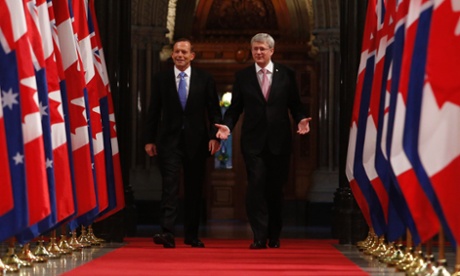
Just after noon Ottawa time Monday, the pool reporter who’d been permitted access to the photo op in prime minister Stephen Harper’s second floor office on Parliament Hill sent his report down the wire. Under different circumstances, it all might have provided inspiration for a haiku. As it was, the pool report reflected something else.
“Both leaders were seated when reporters arrived in the room,” the pool reporter noted. “They stood, shook hands and Harper welcomed Abbott to Ottawa. Abbott said nothing.” Then they sat down again. Then reporters were escorted away. A confounding scene to the rest of the world, perhaps, but as a lesson from political message makers on how to create nothing out of something, it was total perfection. They're getting quite good at it.
Harper was first to speak again in front of TV cameras and the rest of the journalists who hadn’t been invited to the one-act play upstairs earlier. He quickly commended Abbott (erroneously) for eliminating the “job-killing carbon tax.” Abbott, when given the chance, commented on how Canada and Australia are both “resource-driven nations”.
With such commonalities, it was no surprise to hear a question on climate change came. What did both leaders think of US president Barack Obama’s new plans to reduce carbon emissions?
They were equally strident in their replies. Climate change is a “significant problem,” Abbott said, but it’s “not the only or even the most important” one the world faces. Harper delivered a fact check, as he saw it. Obama’s proposals “do not go nearly far enough in the electricity sector as the actions Canada has already taken.” And, Harper added, no matter what they say, “no country is going to take actions on climate change ... that are going to deliberately destroy jobs.”
It’s true that Canada has put in place regulations for coal-fired electricity plants, and the claim is that by 2030, they’ll reduce emissions by 46% from 2005 levels. Obama, by contrast, has only promised a 30% reduction. However, it’s also true that electricity generation is responsible for only 12% of Canada’s greenhouse gas emissions, of which coal contributes a small portion thanks to hydro-electric plants. In the US, electricity accounts for 39% of emissions – and 75% of that is contributed by coal. It’s further the case that Canada will only get halfway to the targets it agreed to in Copenhagen, and has yet to truly tackle emissions from its oil and gas industry, which accounts for approximately 25% of its emissions. In the context of the fantastical, zero-sum choice between action on climate change and jobs, Harper was being entirely truthful: Canada has chosen jobs, whatever that means.
But then we’re into a debate. Which wasn’t the point Monday.
In the days following Obama’s announcement, Canada’s environment minister supplied a line just like the one issued by Harper. “We are pleased the United States is following in Canada’s footsteps,” Leona Aglukkaq told the House of Commons the same day Obama launched his so-called war on coal. “We welcome the movement in the United States to regulate greenhouse gas emissions,” she said a few days later.
On Monday, a similar tone could be heard from Harper’s Australian counterpart. “I am encouraged that president Obama is taking what I would regard as direct action measures to reduce emissions,” Abbott said. “This is very similar to the actions that my government proposes to take in Australia.”
The US move on emissions was a big deal, wasn’t it? This was a huge decision from such a big ally to two resource-reliable nations, right? There was a story for the reporters in the room, wasn't there? One might have thought so.
But listening to Harper and Abbott, the message instead was much as it was upstairs in front of the pool reporter: that the big something that clearly happened in Washington was a non-story, an un-event not worth talking about. Something that was nothing at all.

